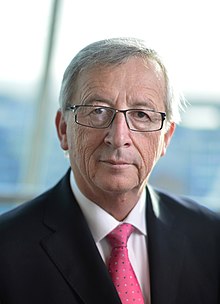Jean-Claude Juncker
| Jean-Claude Juncker | |
|---|---|
 |
|
| President of the European Commission | |
|
Assumed office 1 November 2014 |
|
| Vice President | Frans Timmermans |
| Preceded by | José Manuel Barroso |
| Prime Minister of Luxembourg | |
|
In office 20 January 1995 – 4 December 2013 |
|
| Monarch |
Jean Henri |
| Deputy |
Jacques Poos Lydie Polfer Jean Asselborn |
| Preceded by | Jacques Santer |
| Succeeded by | Xavier Bettel |
| Minister for the Treasury | |
|
In office 23 July 2009 – 4 December 2013 |
|
| Preceded by | Luc Frieden |
| Succeeded by | Vacant |
| Minister for Finances | |
|
In office 14 July 1989 – 23 July 2009 |
|
| Prime Minister | Jacques Santer |
| Preceded by | Jacques Santer |
| Succeeded by | Luc Frieden |
| Minister for Work and Employment | |
|
In office 20 July 1984 – 7 August 1999 |
|
| Prime Minister | Jacques Santer |
| Preceded by | Jacques Santer |
| Succeeded by | François Biltgen |
| Personal details | |
| Born |
9 December 1954 Redange, Luxembourg |
| Political party | Christian Social People's Party |
| Spouse(s) | Christiane Frising |
| Alma mater | University of Strasbourg |
| Signature |  |
| Website | Official website |
Jean-Claude Juncker (Luxembourgish pronunciation: [ʒ̊ɑ̃ːkloːd ˈjʊŋ.kɐ]; born 9 December 1954) is a Luxembourgish politician.
Since 2014, Juncker has been President of the European Commission, which is the European Union (EU) Executive Branch. From 1995 to 2013, he was the 23rd Prime Minister of Luxembourg, and from 1989 to 2009, he was the Minister for Finances. By the time he left office, he was the longest-serving head of any national government in the EU, and one of the longest-serving democratically elected leaders in the world, his tenure encompassing the height of the European financial and sovereign debt crisis. From 2005 to 2013, Juncker served as the first permanent President of the Eurogroup.
In 2014, the European People's Party (EPP) had Juncker as its lead candidate, or Spitzenkandidat, for the Presidency of the Commission in the 2014 elections. This marked the first time that the "Spitzenkandidat" process was employed. The EPP won 220 out of 751 seats in the Parliament. On 27 June 2014, the European Council officially nominated Juncker for the position, and on 15 July 2014, the European Parliament elected him with a majority of 422 votes from a total of 729 cast. He succeeded Jose Manuel Barroso as President on 1 November 2014. Juncker stated that his priorities would be the creation of a digital single market, the development of an EU Energy Union, the negotiation of the Transatlantic Trade Agreement, the continued reform of the Economic and Monetary Union of the European Union—with the social dimension in mind—and a "targeted fiscal capacity" for the Euro Area, as well as to negotiate a new deal with Britain. During his leadership, Britain voted to leave the European Union in 2016. Juncker is the first President that prior to the election has campaigned as a candidate for the position, a process introduced with the Treaty of Lisbon.
...
Wikipedia
